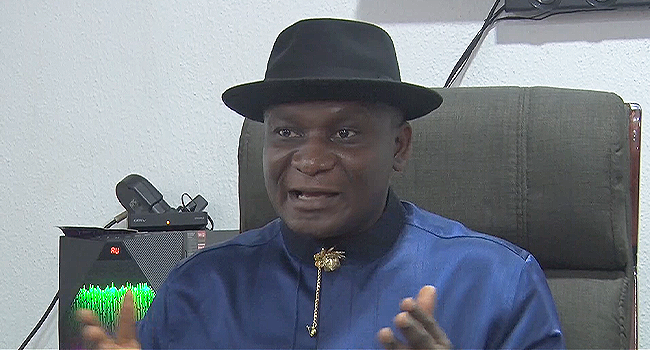The arrival of Dr Samuel Ogbuku at the headquarters of the Niger Delta Development Commission, NDDC, on January 5, 2023, to assume office as the Managing Director and Chief Executive Officer marked a historic turning point.
The rapid development of the Niger Delta region, which is the core mandate of the NDDC, got an impetus when the current Management, led by Ogbuku, mounted the saddle.
From day one, Ogbuku and his team were confronted with the daunting challenges of development in the Niger Delta region. However, the challenges spurred them to look for new ways of achieving results. That inexorably led to the Commission’s decision to begin to do things differently.
In charting a new course, the NDDC had to use new strategies emphasising transparency and accountability. For the first time, the Commission got the approval of the National Assembly to implement a significant budget tied to completing legacy or signature projects in the Niger Delta region.
The N1.911 trillion 2024 budget of the NDDC could be said to be fit to purpose, specifically designed to ensure the completion of legacy projects.
The NDDC Managing Director, Dr Samuel Ogbuku, had to demonstrate composure, confidence, and sincerity to win the approval of the Senate and, subsequently, the House of Representatives for the budget proposals.
Appearing before members of the National Assembly for budget defence could test the wits of many and push their adrenalin into overdrive. Luckily for the current leadership of the NDDC, its performance scorecard is loaded with positive outcomes that inspire hope.
The Senate President, Chief Godswill Akpabio, attested to this recently during the inauguration of the 600-meter Ibeno Bridge and the 6.87-kilometre Iko-Atabrikang-Opolom-IwuoAchang Road, in Akwa Ibom State.
Akpabio, who represented President Bola Ahmed Tinubu at the ceremony, showered praises on the NDDC Board and Management for delivering impactful projects in the Niger Delta region. He said that despite the enormous challenges of developing the region, the NDDC has risen to the task of executing projects that have improved people’s lives.
Against this background, one can understand why the NDDC budget was treated with dispatch and approved with minimal queries. The Senators were convinced that the proposals presented by the NDDC represented a clear roadmap for the rapid development of the Niger Delta region.
In retrospect, the NDDC has been fortunate to enjoy a somewhat cordial relationship with both chambers of the National Assembly. Last year, after initial misgivings over the accumulated budgets of 2021, 2022 and 2023, the National Assembly was convinced to pass the budgets for the three years.
Indeed, the rapport between the NDDC and the lawmakers shone brightly in 2017 when the legislators facilitated the expeditious passage of the amendment to the NDDC Act regarding Nigeria Liquefied Natural Gas, NLNG.
The amended law included a clause stating that the NLNG and other gas-producing companies must contribute not less than three per cent of their annual total budget to the NNDC’s coffers as contributions to the Commission’s fund. It also included that the Minister of Petroleum Resources should fix the percentage.
The NDDC has good reasons to be thankful to the lawmakers among its numerous supervisors. For the records, the Act establishing the NDDC makes it one of the country’s most monitored Federal Government agencies.
The relevant committees in the Senate and House of Representatives, the office of the Secretary to the Federal Government, and the Advisory Committee made up of all the region governors, among others, take turns beaming searchlights on the activities of this very important interventionist agency. In a way, this has helped the commission to always be on its toes.
The Act setting up the NDDC intended for the key development actors in the region, especially the state governments, to play a strategic role and, indeed, take leadership in harmonising the development strides in the region.
The Act provided and constituted the nine governors of the region into the NDDC Advisory Committee, thereby creating a window for their joint input and, most importantly, a platform for regional integration of plans, projects, and programmes.
It is expected that the NDDC Advisory Committee will use the window of the impending review of the Niger Delta Regional Development Master Plan to reflect the vision of the various states into the development compass and take ownership of the plan.
The NDDC Managing Director, Dr Ogbuku, underlines the fact that regional development requires robust funding to effectively address specific and urgent development needs in the Niger Delta region. He notes that timely and flexible financial decision-making is crucial to respond effectively to dynamic regional challenges, stating: “There is no doubt that funding is critical to the development of the Niger Delta region and the implementation of the Renewed Hope Agenda of President Tinubu’s administration.”
Ogbuku said that the 2024 appropriation was anchored on the theme: “Budget of Renewed Hope” in line with the Federal Government’s budget, noting that “the proposed budget seeks to move the Commission from transaction to transformation and it is a product of participatory budgeting process that involves all the major stakeholders in the Niger Delta Region.”
He said, “In preparing the 2024 budget, our primary objective has been to sustain our robust foundation for sustainable economic development. A critical focus of this budget is the present management’s commitment to a greener future.
Seeing that investing in critical infrastructure is a key component of its fiscal strategy, the NDDC launched a ‘Rewind to Rebirth’ initiative as “a strategic vision designed to recalibrate engagement with the Niger Delta and the Commission’s overall intervention implementation plan.” That initiative provided the bulwark for the Commission’s drive to do things differently, as it also embraced the Public Private Partnership, PPP, model to provide alternative funding sources for key development projects and programmes.
Leveraging private capital to augment public funding is important; hence, the NDDC’s deliberate decision to pursue the PPP option. By partnering with the private sector, the Commission can unlock a wealth of resources, expertise, and innovation that will enable it to tackle complex development challenges more effectively.
Perhaps this informed the new strategy of seeking bank credits to bridge the funding gap and accelerate the completion of signature projects. While this approach requires careful planning and risk management, it offers a unique opportunity to achieve more results quickly.
The 2024 budget plan to raise N1 trillion from development and commercial banks to complete 1,006 legacy projects across the region is pragmatic. It should be encouraged to succeed because it targets specific projects, including roads, bridges, electricity projects, school buildings, hospitals, shore protection, and reclamation.
Notably, the current NDDC’s leadership approach to development and collaboration is beginning to yield bountiful results, as seen from the recent commissioning of five flagship projects within 10 days.
Between May 18 and May 28, 2024, the NDDC commissioned the 9km Obehie-Oke-Ikpe road in Ukwa West LGA, Abia State; the 27.5 kilometre Ogbia -Nembe Road, constructed in partnership with Shell Petroleum Development Company, SPDC; the 1×15MVA 33/11KV electricity injection substation in Amufi, Ikpoba-Okha Local Government Area in Benin City, Edo State; the 45km double-circuit 33KV feeder line from Omotosho Power Station to Okitipupa, Ondo State and the NDDC 6km Iko-Atabrikang-Akata-Opulom-Ikot Inwang-Okoroutip-Iwochang Road and 600m Ibeno Bridge in Ibeno LGA, Akwa Ibom State.
These landmark projects, among the 92 infrastructure projects completed at a cost of N84 billion across the nine mandate states of the NDDC, speak of the impact the Commission is making in the quest to quicken the pace of development in Nigeria’s oil-rich region.
Even with the huge portfolio of projects, stakeholders must not lose sight of the fact that the NDDC is not just about infrastructure development. The interventionist agency envisions looking at development from a holistic standpoint that includes investing in education, healthcare, skill training, and youth and women’s development.
An all-encompassing development goes beyond building roads and bridges and entails human capital development. This, too, must be funded adequately and at the right time.
.Reaffirms Commitment to Holistic Development in Niger Delta
The Managing Director of the Niger Delta Development Commission, NDDC, Dr Samuel Ogbuku, has reaffirmed the commitment of the Commission to executing impactful projects and fast-tracking development for the benefit of all the ethnic nationalities in the Niger Delta region.
Ogbuku gave the assurance when he hosted a delegation led by the President General of Ogbakor Ikwerre Cultural Organisation Worldwide, Eze (Dr) Godspower Onuekwa, at the NDDC headquarters in Port Harcourt.
The NDDC Chief Executive Officer stated that the Commission was open to all ethnic nationalities in the Niger Delta region, noting that its mandate was to serve the people and ensure sustainable development of all communities in the region.
Ogbuku said the NDDC was executing life-changing projects in the Niger Delta region to give meaning to President Bola Ahmed Tinubu’s administration’s Renewed Hope Agenda.
He explained that the Commission was giving opportunities to Niger Delta youths through an innovative programme called Holistic Opportunity Projects of Engagement, Project HOPE.
He noted that Project HOPE had helped the Commission to develop a comprehensive digital repository comprising important information about the youths of the Niger Delta region, including their qualifications, skills, interests, needs, and current employment status.
The NDDC boss charged the Ogbakor Ikwerre delegation to always promote peace, as development could only occur in a peaceful and safe environment. “I urge you to support the policies of President Tinubu’s administration. Let us ensure peace in our communities,” he advised.
Ogbuku assured the Ikwerre group that the NDDC was committed to accelerating the development of the Niger Delta region, stating: “We are going to undertake more legacy and regional projects. Currently, we have embarked on an elaborate project to light up the Niger Delta with solar-powered street lights as part of the measures to reduce criminality in our communities.”
Earlier, the President General of Ogbakor Ikwerre Cultural Organisation Worldwide, Eze Godspower Onuekwa, appealed to the NDDC to extend more development projects to Ikwerre land to enhance the people’s living conditions.
He applauded the NDDC boss, noting: “We have observed you as the Managing Director of NDDC with inspiration that your achievements and milestones are well entrenched all over the Niger Delta States. For that reason, we say Congratulations on a well-deserved appointment.”
He regretted that the goodwill and the intentions of NDDC were being thwarted by unscrupulous contractors who abandoned the contracts awarded to them. He advised the NDDC to incorporate the Ogbakor Ikwerre Cultural Organization in monitoring projects for effectiveness and efficiency.






















